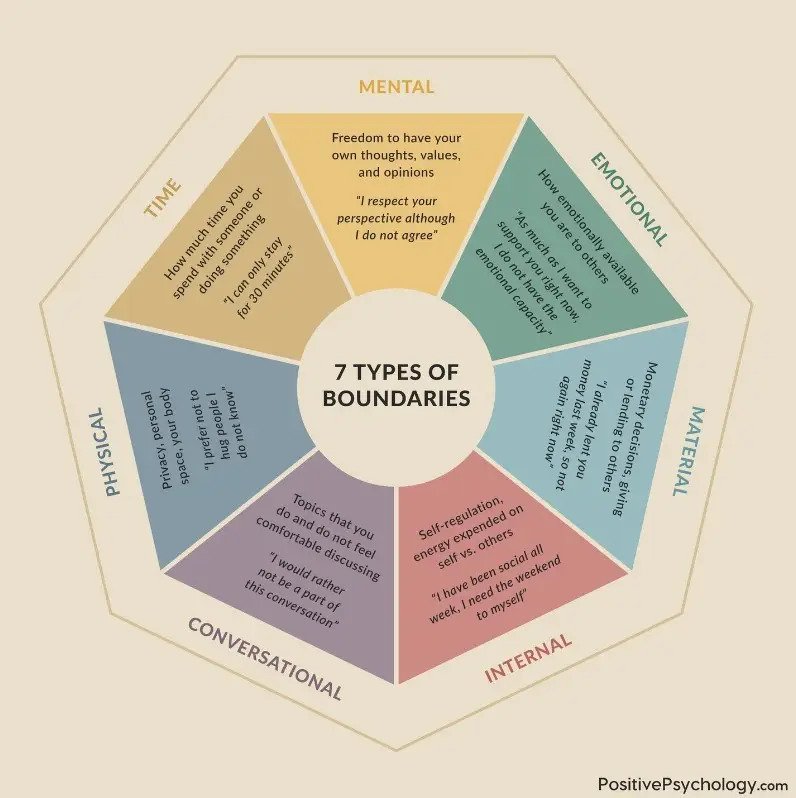What Are Boundaries?
There are many dynamic dimensions to a wellness journey. An often overlooked but vital component to all wellness, though, is boundaries. But what are they? Many people know what the word “boundaries” means, but they have no idea what they actually are.
You might think of boundaries as something like a property line or “brick wall” used to keep people out. But boundaries are not rigid lines drawn in the sand that are clear for all to see. Boundaries are limits we identify for ourselves, and apply through action or communication.
When we define what we need to feel secure and healthy, when we need it, and create tools to protect those parts of ourselves, we can do wonders for our well-being.
Boundaries are essential to having strong and healthy relationships. Having healthy boundaries means establishing your limits and clearly expressing them. Setting healthy boundaries is an important aspect of great self-care and can be one of the best gifts we offer ourselves. Boundaries also give way to the idea that we teach people how to treat us.
Why Boundaries Are So Important
Healthy boundaries define what is appropriate behavior in our relationships – behavior that keeps both parties safe. Boundaries differ from person to person and are mediated by variations in culture, personality, and social context. For example, boundaries appropriate in a business meeting would seem irrelevant at a dinner with old friends. Setting boundaries defines our expectations of ourselves and others in different kinds of relationships.
Setting healthy boundaries requires self-awareness. We need to be clear about our expectations of ourselves and others, and what we are and are not comfortable with in specific situations. Setting healthy boundaries requires good communication skills that convey assertiveness and clarity.
Assertiveness involves expressing your feelings openly and respectfully. It does not entail making demands, but it requires people to listen to you. Setting healthy boundaries requires you to assert your needs and priorities as a form of self-care.
Related: Why your mental wellness matters
Types of Boundaries
Physical Boundaries
Physical boundaries include your body, sense of personal space, sexual orientation, and privacy. These boundaries are expressed through clothing, shelter, noise tolerance, verbal instruction, and body language.
An example of physical boundary violation: a close talker. Your immediate and automatic reaction is to step back in order to reset your personal space. By doing this, you send a non-verbal message that when this person stands so close you feel an invasion of your personal space. If the person continues to move closer, you might verbally protect your boundary by telling him/her to stop crowding you.
Other examples of physical boundary invasions include:
- Inappropriate touching, such as unwanted sexual advances
- Looking through others’ personal files and emails
- Not allowing others their personal space. (e.g., barging into your boss’s office without knocking)
Emotional and Intellectual Boundaries
These boundaries protect your sense of self-esteem and ability to separate your feelings from others’. When you have weak emotional boundaries, it’s like getting caught in the midst of a hurricane with no protection. You expose yourself to being greatly affected by others’ words, thoughts, and actions and end up feeling bruised, wounded, and battered.
These include beliefs, behaviors, choices, sense of responsibility, and your ability to be intimate with others.
Examples of emotional and intellectual boundary invasions are:
- Not knowing how to separate your feelings from your partner’s and allowing their mood to dictate your level of happiness or sadness (a.k.a. codependency)
- Sacrificing your plans, dreams, and goals in order to please others
- Not taking responsibility for yourself and blaming others for your problems
Why do we NOT enforce or uphold our boundaries?
- FEAR of rejection and, ultimately, abandonment
- FEAR of confrontation
- We were not taught healthy boundaries
- Safety concerns
Though important, boundaries are not always easy to implement, and are particularly challenging for people who may have come from environments where there were no boundaries, or respect for individual autonomy. Poor boundaries contribute to a dysfunctional family dynamic and culture. They can also often lead to unhealthy codependency and can even cause trauma. Experiencing poor boundaries can often manifest in an individual as chronic people-pleasing, caretaking, problem-solving and consistently putting the needs of another before your own. This can often result in burnout and resentment and could lead to unhealthy coping mechanisms.
Related: How to Set Boundaries with Family
Melody Beattie, an American self-help author and household name in addiction and recovery circles, says:
“Boundaries emerge from deep within. They are connected to letting go of guilt and shame, and to changing our beliefs about what we deserve. As our thinking about this becomes clearer, so will our boundaries. Boundaries are also connected to a Higher Timing than our own. We’ll set a limit when we’re ready, and not a moment before. So will others. There’s something magical about reaching that point of becoming ready to set a limit. We know we mean what we say; others take us seriously too. Things change, not because we’re controlling others, but because we’ve changed.”
Poor boundaries arise sometimes in adults who have been raised by childhood carers who’ve taught them that expressing their needs is bad and selfish. However, not accepting the discomfort that comes from setting healthy boundaries in adulthood means settling for unhealthy relationships that can cause manipulation and abuse.
7 Examples of how to set healthy boundaries, from PositivePsychology.com:

(For the original image please go here. WTCSB does not own the rights to this image.)
According to Brene Brown, Ph.D., people with strong boundaries are the most compassionate. Does that surprise you? Often people think that setting boundaries is mean or wrong. You may feel guilty when you set boundaries because you think you don’t have a right to ask for what you want or need.
Boundaries aren’t mean or wrong. It’s kind and respectful to tell people what’s okay and what’s not okay with you. This sets clear expectations.
Boundaries, A Gift to Self
Boundaries can be a great gift to ourselves. Boundaries protect us. They protect us from physical, mental and emotional harm. Boundaries also provide emotional freedom from self-criticism and second-guessing yourself. When you say “No” to things you don’t want to do and people who drag you down, you can say “Yes” to spending time with people who fill you up emotionally, activities that you’re interested in and enjoy, and to a happier, healthier self.
Here are some other gifts of setting boundaries:
1. You’re More Self-aware
Self-awareness is the art of recognizing your needs and feelings as your own, and not tied to any person or your environment. Creating your own limitations is an inherently self-aware act — and that can be incredibly beneficial for your own welfare.
2. You Become a Better Friend and Partner
Boundaries make it possible to allow yourself to recharge. And when you’re not totally tapped out, you have more energy to devote to the ones you love. You’re also more respectful of their own needs as a result.
3. You Take Better Care of Yourself
It is not selfish to take care of yourself and your needs while also considering the needs of others.
4. You’re Less Stressed
Without a boundary, we absorb the stress around us and our own psychological resources get drained.
5. You Learn How To Say “No”
“No” may be a small word but it’s certainly powerful. The most basic way of establishing a boundary is declining anything you don’t have the capacity to handle.
Your Mental Wellness Matters
If you need some help learning how to set boundaries or are struggling with low self-esteem, upsetting thoughts and feelings, your relationships or another aspect of your mental wellness, we are here to help. Western Tidewater CSB is your local, single-point-of-entry for behavioral health services. We’re proud to have served Franklin, Suffolk, and the counties of Isle of Wight and Southampton since 1971 and to continue to serve our community.






